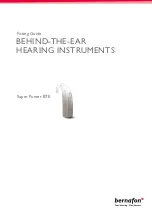
56
57
If you are not using your hearing aid for a long period of time,
store it in a box with a drying capsule or in a well ventilated
location. This allows moisture to evaporate from your hearing
aid and prevents a potential impact on its performance.
Always use new batteries for your hearing aid. In case a
battery is leaking, replace it immediately with a new one to
avoid any skin irritation. You can return used batteries to your
hearing care professional.
The batteries used in these hearing aids should not exceed
1.5 Volts. Please do not use silver-zinc or Li-ion (lithium-ion)
rechargeable batteries as these may cause severe damage to
your hearing aids. The table in chapter 5 explains exactly
which type of battery your particular hearing aids require.
Remove the battery if you are not using your hearing aid for a
long period of time.
Never immerse your hearing aid in water! Protect it from
excessive moisture. Always remove your hearing aid before
showering, bathing, or swimming, as the hearing aid contains
sensitive electronic parts.
Protect your hearing aid from heat (never leave near a window
or in the car). Never use a microwave or other heating devices
to dry your hearing aid. Ask your hearing care professional
about suitable drying methods.
When you are not using your hearing aid, leave the battery
door open so that any moisture can evaporate. Make sure that
you always completely dry your hearing aid after use. Store
the hearing aid in a safe, dry and clean place.
Do not drop your hearing aid! Dropping onto a hard surface
can damage your hearing aid.
21.2 Information on product safety
































